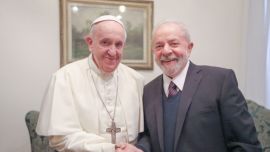President Mauricio Macri's government presented a tight budget on Monday under pressure from the International monetary Fund to achieve fiscal balance.
"For the first time since 2009, we're presenting a balanced budget," Economy Minister Nicolás Dujovne told Congress. "Converging toward fiscal balance is a central objective of the government's economic policy."
Argentina's economy is struggling due to the currency suffering a crisis of confidence having lost around half its value against the dollar this year alone.
The country's primary budget deficit has dropped from six percent in 2015 to 3.9 last year and is expected to reach 2.7 this year, according to the government.
"Sustainability in the public accounts is vital to maintain economic order," added Dujovne.
"Fiscal solvency is also necessary to reduce the economy's vulnerability."
In order to calculate the 2019 budget, the government is counting on a reduction in inflation from an estimated 42 percent (45 percent, according to the private sector) this year to just 23 percent next year, while predicting that the economy will shrink two percent in 2018 and 0.5 percent in 2019.
It's based on an exchange rate of 40.10 pesos to the US dollar, compared to the actual rate of 40.36 on Monday.
It began the year at 18 but after losing 6.81 percent last week to pass the 40 per US dollar barrier, it recovered slightly on Monday, 0.32 percent.
Earlier this month, President Macri announced a series of austerity measures to try to get the freefalling peso under control, but that only led to an increase in protests and a further drop in the currency's value.
Argentina negotiated a US$50-billion loan from the IMF earlier this year, receiving an initial tranche of US$15 billion in June.
But a request for accelerated disbursement of the remainder of the loan triggered a 20 percent drop in the peso over just two days in August.
On Monday the IMF said "important progress" was being made in "strengthening the economic policy plan."
Dujovne called on Congress to support the budget to give "a very important signal to reduce vulnerability."
He will answer legislators' questions on Thursday.
But opposition deputy Diego Bossio warned that "we won't adopt an express budget, we're going to thoroughly analyze it."
Argentina's currency woes have hit the population hard, reducing their spending power as their salaries lose real value.
Leading trade union, the CGT has called for a nationwide strike on September 25.
- TIMES/AFP























Comments